International Students in UK: Cultural Adjustment & Education
VerifiedAdded on 2023/06/15
|53
|17233
|436
Dissertation
AI Summary
This dissertation explores the experiences of international undergraduate students within the UK's higher education system, focusing on the challenges they face due to cultural and educational differences. The research delves into the cultural and academic shocks experienced by international students and their impact on academic performance. Through literature review and interviews, the study identifies issues such as language barriers, lifestyle adjustments, and differences in educational practices and assessment methods. The findings highlight that these challenges can lead to poor academic outcomes, emphasizing the need for universities and educational frameworks to address these issues to improve the experiences and academic success of international students in the UK. This document is available on Desklib, a platform offering AI-based study tools and a wealth of academic resources for students.

DISSERTATION
Paraphrase This Document
Need a fresh take? Get an instant paraphrase of this document with our AI Paraphraser
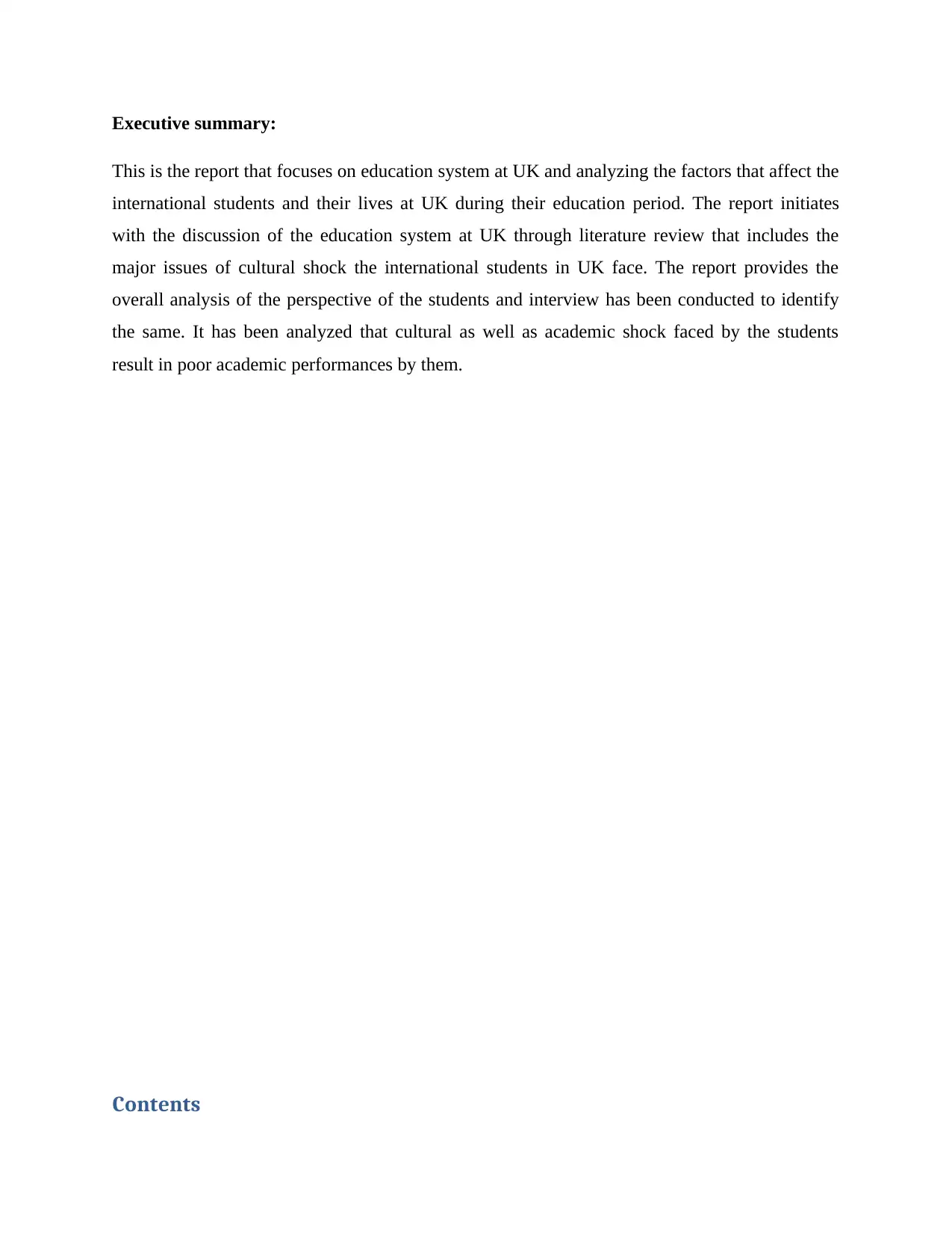
Executive summary:
This is the report that focuses on education system at UK and analyzing the factors that affect the
international students and their lives at UK during their education period. The report initiates
with the discussion of the education system at UK through literature review that includes the
major issues of cultural shock the international students in UK face. The report provides the
overall analysis of the perspective of the students and interview has been conducted to identify
the same. It has been analyzed that cultural as well as academic shock faced by the students
result in poor academic performances by them.
Contents
This is the report that focuses on education system at UK and analyzing the factors that affect the
international students and their lives at UK during their education period. The report initiates
with the discussion of the education system at UK through literature review that includes the
major issues of cultural shock the international students in UK face. The report provides the
overall analysis of the perspective of the students and interview has been conducted to identify
the same. It has been analyzed that cultural as well as academic shock faced by the students
result in poor academic performances by them.
Contents
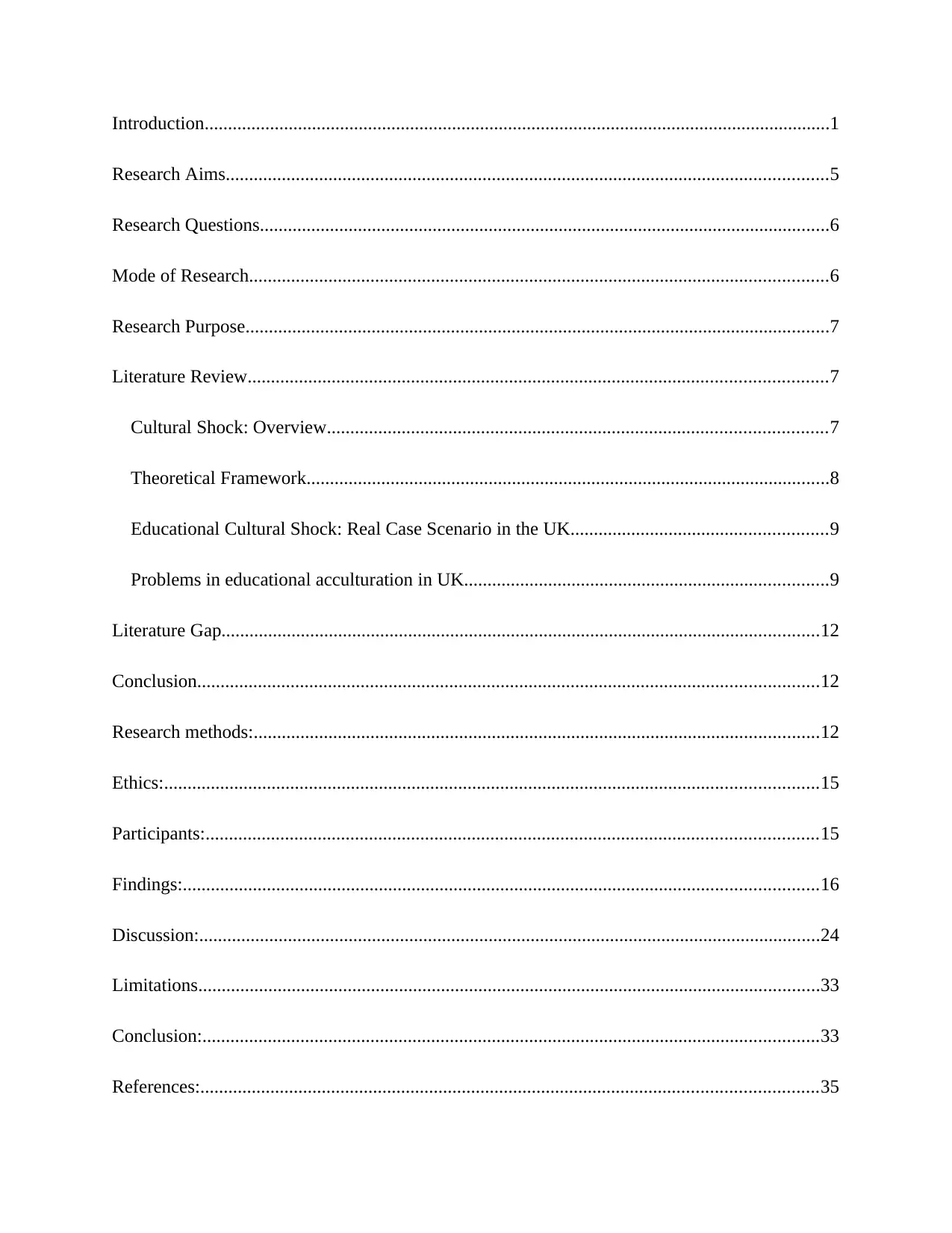
Introduction......................................................................................................................................1
Research Aims.................................................................................................................................5
Research Questions..........................................................................................................................6
Mode of Research............................................................................................................................6
Research Purpose.............................................................................................................................7
Literature Review............................................................................................................................7
Cultural Shock: Overview...........................................................................................................7
Theoretical Framework................................................................................................................8
Educational Cultural Shock: Real Case Scenario in the UK.......................................................9
Problems in educational acculturation in UK..............................................................................9
Literature Gap................................................................................................................................12
Conclusion.....................................................................................................................................12
Research methods:.........................................................................................................................12
Ethics:............................................................................................................................................15
Participants:...................................................................................................................................15
Findings:........................................................................................................................................16
Discussion:.....................................................................................................................................24
Limitations.....................................................................................................................................33
Conclusion:....................................................................................................................................33
References:....................................................................................................................................35
Research Aims.................................................................................................................................5
Research Questions..........................................................................................................................6
Mode of Research............................................................................................................................6
Research Purpose.............................................................................................................................7
Literature Review............................................................................................................................7
Cultural Shock: Overview...........................................................................................................7
Theoretical Framework................................................................................................................8
Educational Cultural Shock: Real Case Scenario in the UK.......................................................9
Problems in educational acculturation in UK..............................................................................9
Literature Gap................................................................................................................................12
Conclusion.....................................................................................................................................12
Research methods:.........................................................................................................................12
Ethics:............................................................................................................................................15
Participants:...................................................................................................................................15
Findings:........................................................................................................................................16
Discussion:.....................................................................................................................................24
Limitations.....................................................................................................................................33
Conclusion:....................................................................................................................................33
References:....................................................................................................................................35
⊘ This is a preview!⊘
Do you want full access?
Subscribe today to unlock all pages.

Trusted by 1+ million students worldwide

Appendix:......................................................................................................................................40
Paraphrase This Document
Need a fresh take? Get an instant paraphrase of this document with our AI Paraphraser
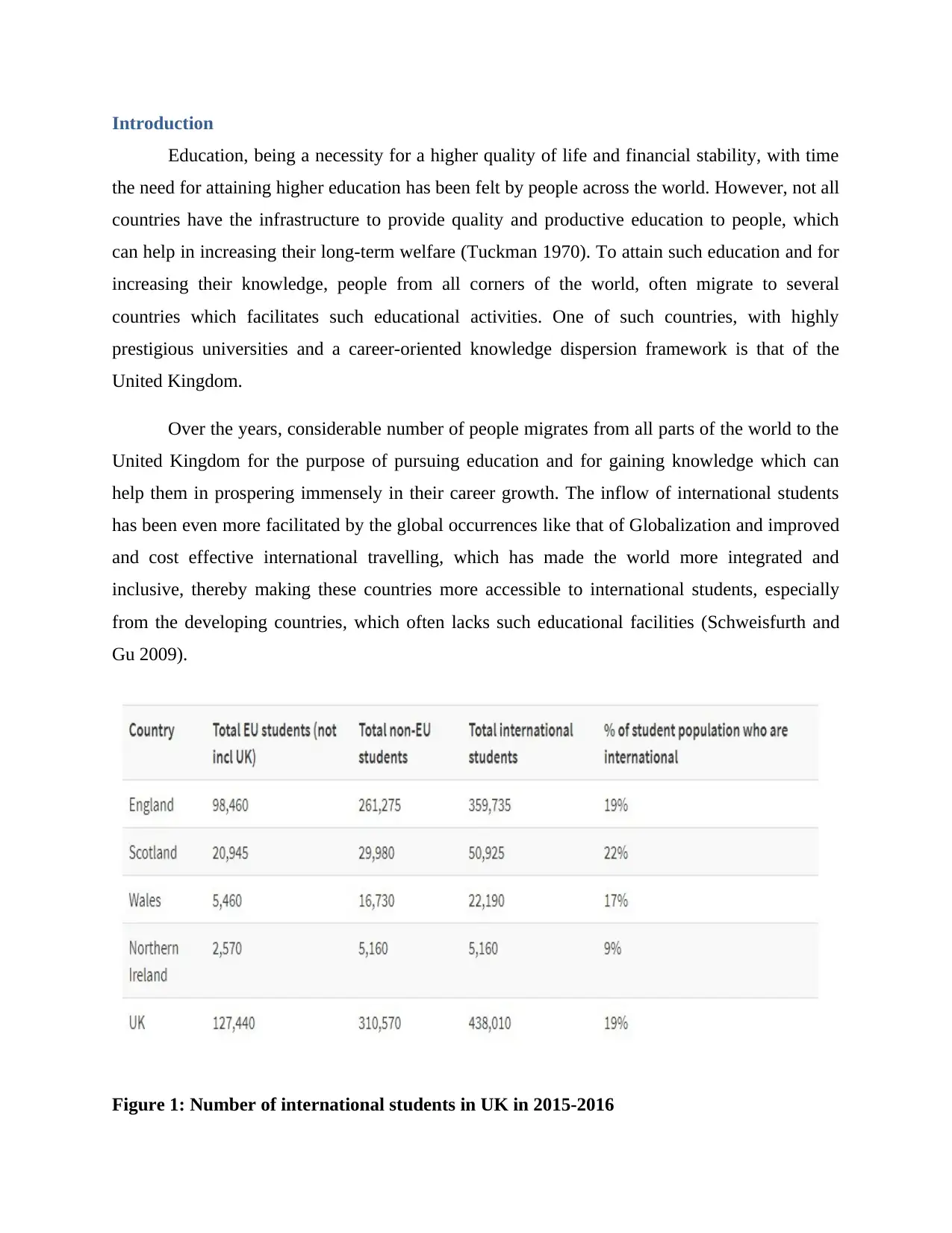
Introduction
Education, being a necessity for a higher quality of life and financial stability, with time
the need for attaining higher education has been felt by people across the world. However, not all
countries have the infrastructure to provide quality and productive education to people, which
can help in increasing their long-term welfare (Tuckman 1970). To attain such education and for
increasing their knowledge, people from all corners of the world, often migrate to several
countries which facilitates such educational activities. One of such countries, with highly
prestigious universities and a career-oriented knowledge dispersion framework is that of the
United Kingdom.
Over the years, considerable number of people migrates from all parts of the world to the
United Kingdom for the purpose of pursuing education and for gaining knowledge which can
help them in prospering immensely in their career growth. The inflow of international students
has been even more facilitated by the global occurrences like that of Globalization and improved
and cost effective international travelling, which has made the world more integrated and
inclusive, thereby making these countries more accessible to international students, especially
from the developing countries, which often lacks such educational facilities (Schweisfurth and
Gu 2009).
Figure 1: Number of international students in UK in 2015-2016
Education, being a necessity for a higher quality of life and financial stability, with time
the need for attaining higher education has been felt by people across the world. However, not all
countries have the infrastructure to provide quality and productive education to people, which
can help in increasing their long-term welfare (Tuckman 1970). To attain such education and for
increasing their knowledge, people from all corners of the world, often migrate to several
countries which facilitates such educational activities. One of such countries, with highly
prestigious universities and a career-oriented knowledge dispersion framework is that of the
United Kingdom.
Over the years, considerable number of people migrates from all parts of the world to the
United Kingdom for the purpose of pursuing education and for gaining knowledge which can
help them in prospering immensely in their career growth. The inflow of international students
has been even more facilitated by the global occurrences like that of Globalization and improved
and cost effective international travelling, which has made the world more integrated and
inclusive, thereby making these countries more accessible to international students, especially
from the developing countries, which often lacks such educational facilities (Schweisfurth and
Gu 2009).
Figure 1: Number of international students in UK in 2015-2016
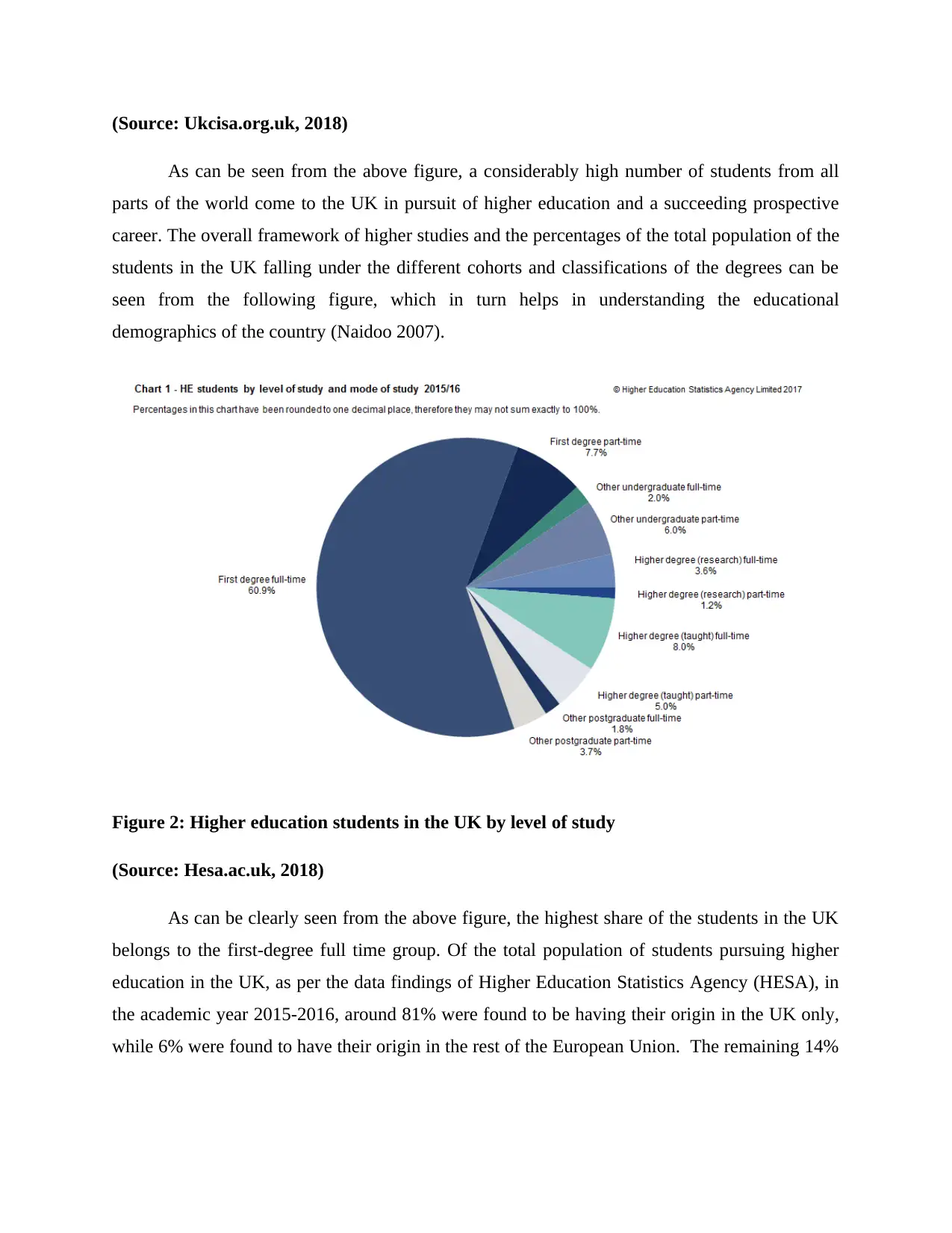
(Source: Ukcisa.org.uk, 2018)
As can be seen from the above figure, a considerably high number of students from all
parts of the world come to the UK in pursuit of higher education and a succeeding prospective
career. The overall framework of higher studies and the percentages of the total population of the
students in the UK falling under the different cohorts and classifications of the degrees can be
seen from the following figure, which in turn helps in understanding the educational
demographics of the country (Naidoo 2007).
Figure 2: Higher education students in the UK by level of study
(Source: Hesa.ac.uk, 2018)
As can be clearly seen from the above figure, the highest share of the students in the UK
belongs to the first-degree full time group. Of the total population of students pursuing higher
education in the UK, as per the data findings of Higher Education Statistics Agency (HESA), in
the academic year 2015-2016, around 81% were found to be having their origin in the UK only,
while 6% were found to have their origin in the rest of the European Union. The remaining 14%
As can be seen from the above figure, a considerably high number of students from all
parts of the world come to the UK in pursuit of higher education and a succeeding prospective
career. The overall framework of higher studies and the percentages of the total population of the
students in the UK falling under the different cohorts and classifications of the degrees can be
seen from the following figure, which in turn helps in understanding the educational
demographics of the country (Naidoo 2007).
Figure 2: Higher education students in the UK by level of study
(Source: Hesa.ac.uk, 2018)
As can be clearly seen from the above figure, the highest share of the students in the UK
belongs to the first-degree full time group. Of the total population of students pursuing higher
education in the UK, as per the data findings of Higher Education Statistics Agency (HESA), in
the academic year 2015-2016, around 81% were found to be having their origin in the UK only,
while 6% were found to have their origin in the rest of the European Union. The remaining 14%
⊘ This is a preview!⊘
Do you want full access?
Subscribe today to unlock all pages.

Trusted by 1+ million students worldwide
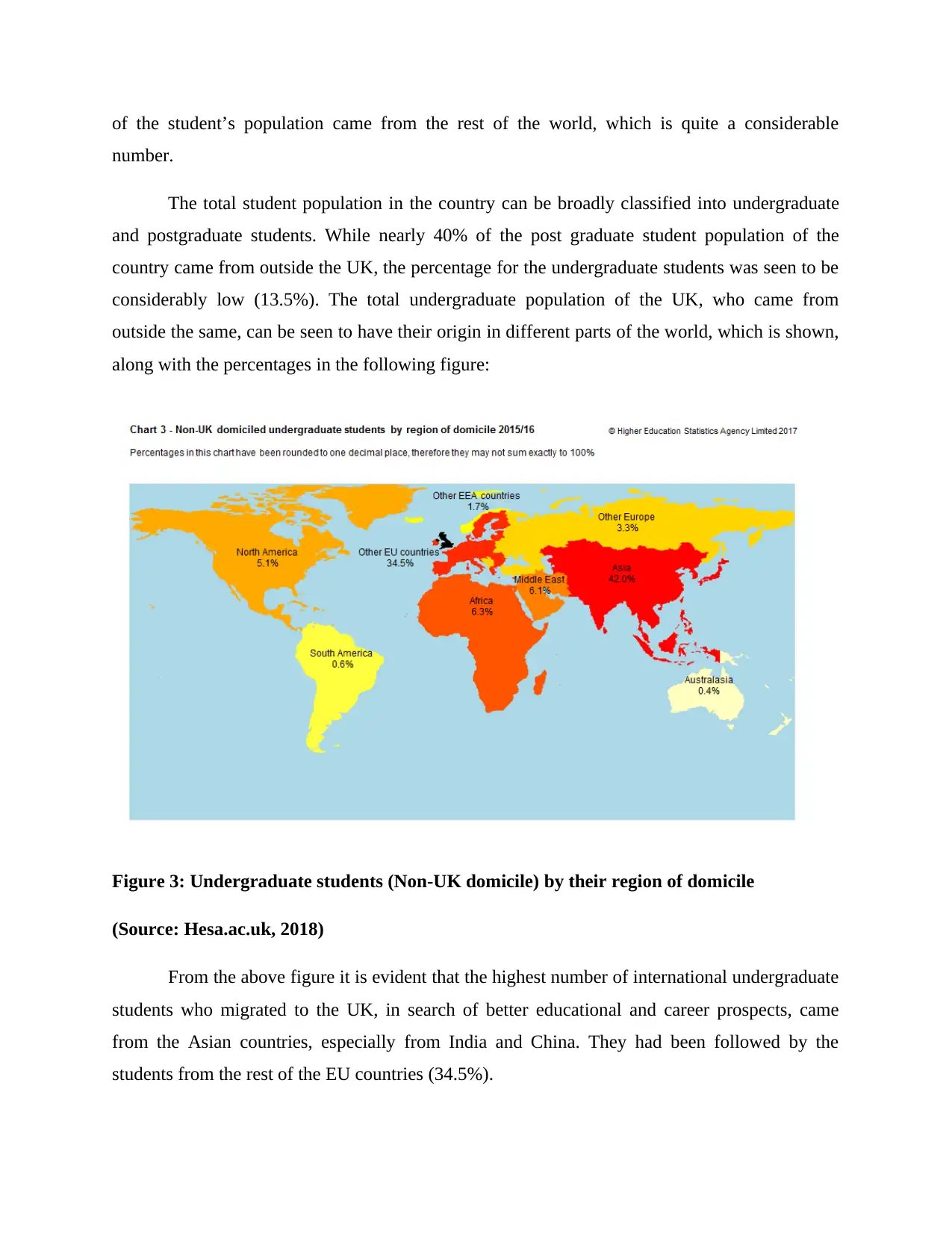
of the student’s population came from the rest of the world, which is quite a considerable
number.
The total student population in the country can be broadly classified into undergraduate
and postgraduate students. While nearly 40% of the post graduate student population of the
country came from outside the UK, the percentage for the undergraduate students was seen to be
considerably low (13.5%). The total undergraduate population of the UK, who came from
outside the same, can be seen to have their origin in different parts of the world, which is shown,
along with the percentages in the following figure:
Figure 3: Undergraduate students (Non-UK domicile) by their region of domicile
(Source: Hesa.ac.uk, 2018)
From the above figure it is evident that the highest number of international undergraduate
students who migrated to the UK, in search of better educational and career prospects, came
from the Asian countries, especially from India and China. They had been followed by the
students from the rest of the EU countries (34.5%).
number.
The total student population in the country can be broadly classified into undergraduate
and postgraduate students. While nearly 40% of the post graduate student population of the
country came from outside the UK, the percentage for the undergraduate students was seen to be
considerably low (13.5%). The total undergraduate population of the UK, who came from
outside the same, can be seen to have their origin in different parts of the world, which is shown,
along with the percentages in the following figure:
Figure 3: Undergraduate students (Non-UK domicile) by their region of domicile
(Source: Hesa.ac.uk, 2018)
From the above figure it is evident that the highest number of international undergraduate
students who migrated to the UK, in search of better educational and career prospects, came
from the Asian countries, especially from India and China. They had been followed by the
students from the rest of the EU countries (34.5%).
Paraphrase This Document
Need a fresh take? Get an instant paraphrase of this document with our AI Paraphraser
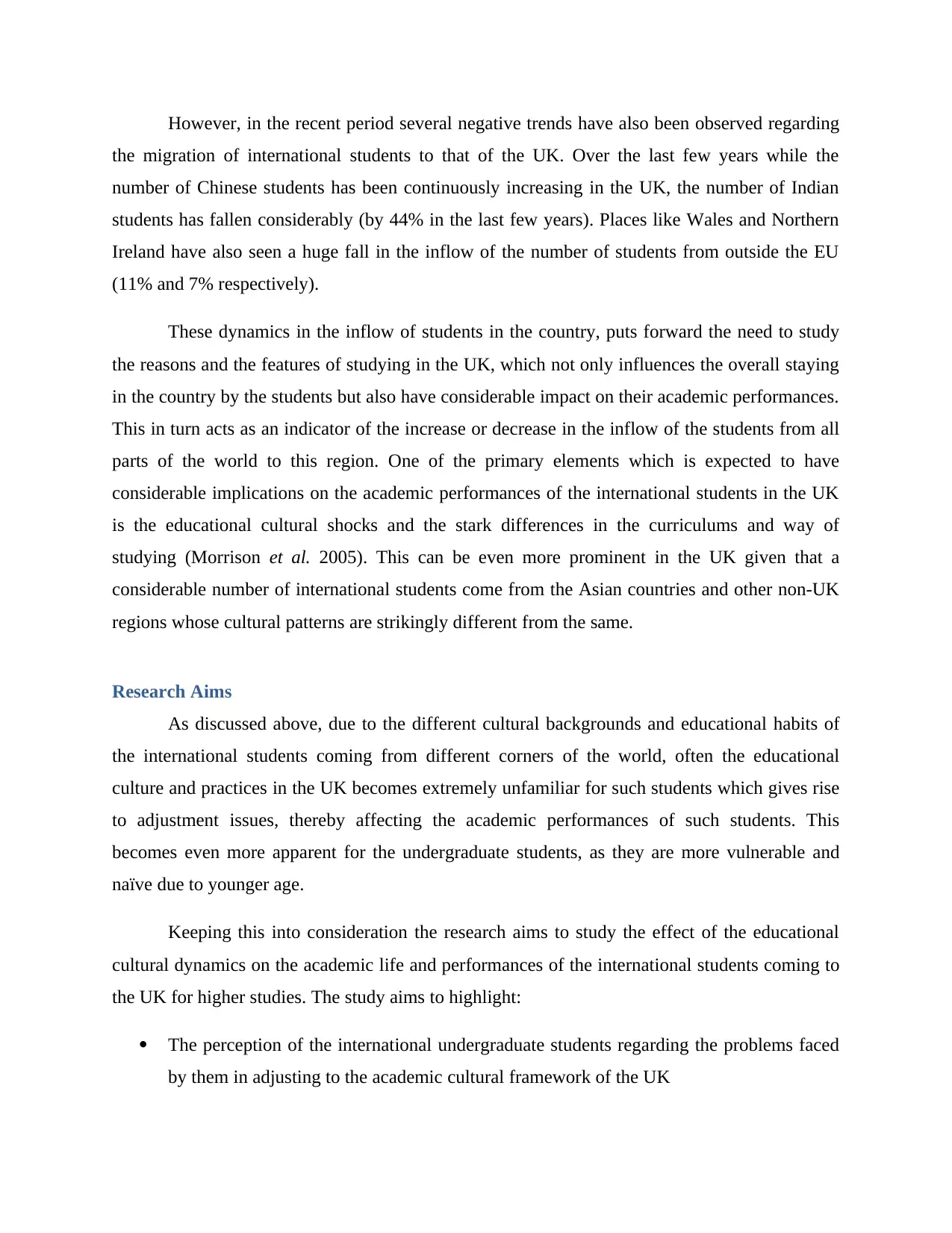
However, in the recent period several negative trends have also been observed regarding
the migration of international students to that of the UK. Over the last few years while the
number of Chinese students has been continuously increasing in the UK, the number of Indian
students has fallen considerably (by 44% in the last few years). Places like Wales and Northern
Ireland have also seen a huge fall in the inflow of the number of students from outside the EU
(11% and 7% respectively).
These dynamics in the inflow of students in the country, puts forward the need to study
the reasons and the features of studying in the UK, which not only influences the overall staying
in the country by the students but also have considerable impact on their academic performances.
This in turn acts as an indicator of the increase or decrease in the inflow of the students from all
parts of the world to this region. One of the primary elements which is expected to have
considerable implications on the academic performances of the international students in the UK
is the educational cultural shocks and the stark differences in the curriculums and way of
studying (Morrison et al. 2005). This can be even more prominent in the UK given that a
considerable number of international students come from the Asian countries and other non-UK
regions whose cultural patterns are strikingly different from the same.
Research Aims
As discussed above, due to the different cultural backgrounds and educational habits of
the international students coming from different corners of the world, often the educational
culture and practices in the UK becomes extremely unfamiliar for such students which gives rise
to adjustment issues, thereby affecting the academic performances of such students. This
becomes even more apparent for the undergraduate students, as they are more vulnerable and
naïve due to younger age.
Keeping this into consideration the research aims to study the effect of the educational
cultural dynamics on the academic life and performances of the international students coming to
the UK for higher studies. The study aims to highlight:
The perception of the international undergraduate students regarding the problems faced
by them in adjusting to the academic cultural framework of the UK
the migration of international students to that of the UK. Over the last few years while the
number of Chinese students has been continuously increasing in the UK, the number of Indian
students has fallen considerably (by 44% in the last few years). Places like Wales and Northern
Ireland have also seen a huge fall in the inflow of the number of students from outside the EU
(11% and 7% respectively).
These dynamics in the inflow of students in the country, puts forward the need to study
the reasons and the features of studying in the UK, which not only influences the overall staying
in the country by the students but also have considerable impact on their academic performances.
This in turn acts as an indicator of the increase or decrease in the inflow of the students from all
parts of the world to this region. One of the primary elements which is expected to have
considerable implications on the academic performances of the international students in the UK
is the educational cultural shocks and the stark differences in the curriculums and way of
studying (Morrison et al. 2005). This can be even more prominent in the UK given that a
considerable number of international students come from the Asian countries and other non-UK
regions whose cultural patterns are strikingly different from the same.
Research Aims
As discussed above, due to the different cultural backgrounds and educational habits of
the international students coming from different corners of the world, often the educational
culture and practices in the UK becomes extremely unfamiliar for such students which gives rise
to adjustment issues, thereby affecting the academic performances of such students. This
becomes even more apparent for the undergraduate students, as they are more vulnerable and
naïve due to younger age.
Keeping this into consideration the research aims to study the effect of the educational
cultural dynamics on the academic life and performances of the international students coming to
the UK for higher studies. The study aims to highlight:
The perception of the international undergraduate students regarding the problems faced
by them in adjusting to the academic cultural framework of the UK
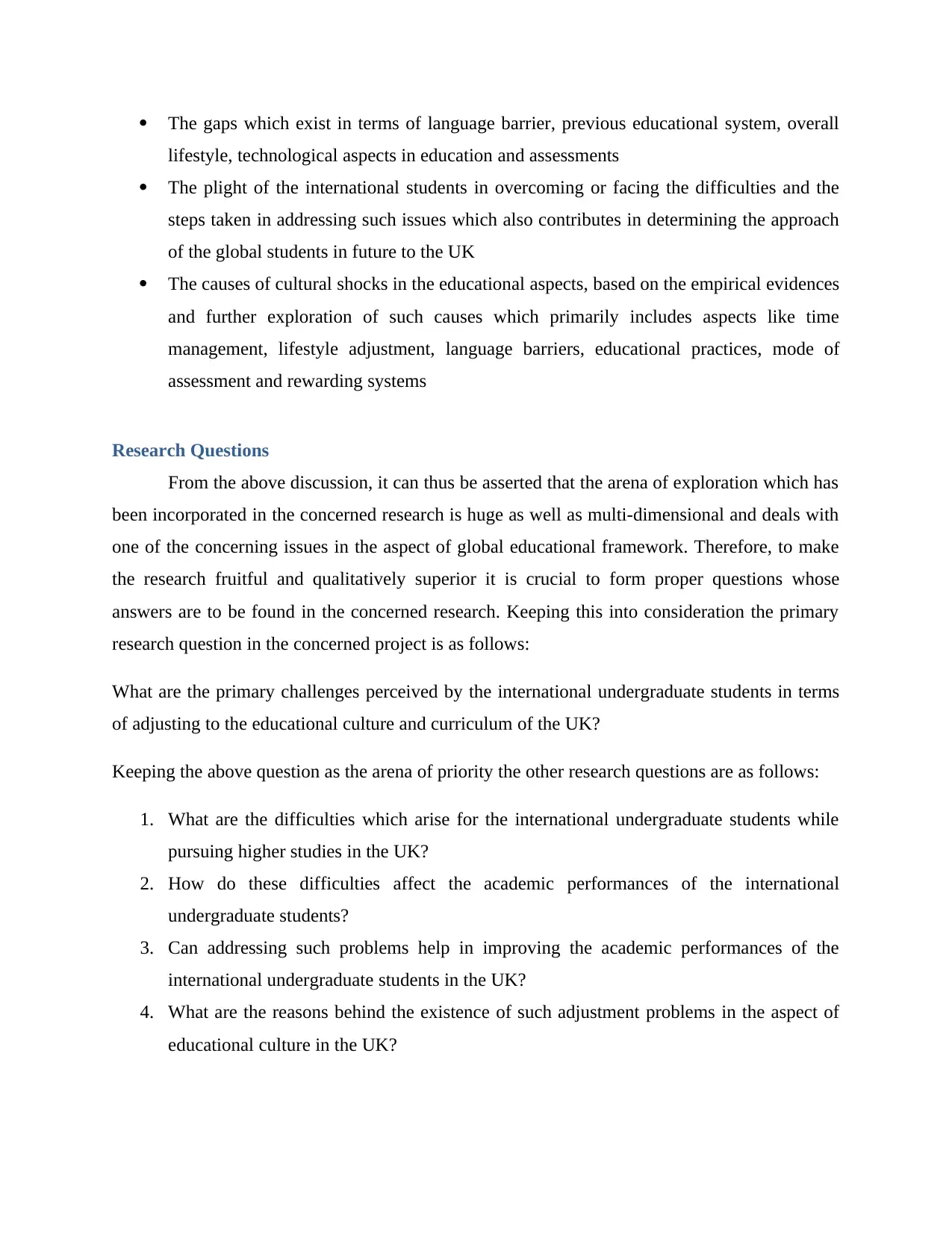
The gaps which exist in terms of language barrier, previous educational system, overall
lifestyle, technological aspects in education and assessments
The plight of the international students in overcoming or facing the difficulties and the
steps taken in addressing such issues which also contributes in determining the approach
of the global students in future to the UK
The causes of cultural shocks in the educational aspects, based on the empirical evidences
and further exploration of such causes which primarily includes aspects like time
management, lifestyle adjustment, language barriers, educational practices, mode of
assessment and rewarding systems
Research Questions
From the above discussion, it can thus be asserted that the arena of exploration which has
been incorporated in the concerned research is huge as well as multi-dimensional and deals with
one of the concerning issues in the aspect of global educational framework. Therefore, to make
the research fruitful and qualitatively superior it is crucial to form proper questions whose
answers are to be found in the concerned research. Keeping this into consideration the primary
research question in the concerned project is as follows:
What are the primary challenges perceived by the international undergraduate students in terms
of adjusting to the educational culture and curriculum of the UK?
Keeping the above question as the arena of priority the other research questions are as follows:
1. What are the difficulties which arise for the international undergraduate students while
pursuing higher studies in the UK?
2. How do these difficulties affect the academic performances of the international
undergraduate students?
3. Can addressing such problems help in improving the academic performances of the
international undergraduate students in the UK?
4. What are the reasons behind the existence of such adjustment problems in the aspect of
educational culture in the UK?
lifestyle, technological aspects in education and assessments
The plight of the international students in overcoming or facing the difficulties and the
steps taken in addressing such issues which also contributes in determining the approach
of the global students in future to the UK
The causes of cultural shocks in the educational aspects, based on the empirical evidences
and further exploration of such causes which primarily includes aspects like time
management, lifestyle adjustment, language barriers, educational practices, mode of
assessment and rewarding systems
Research Questions
From the above discussion, it can thus be asserted that the arena of exploration which has
been incorporated in the concerned research is huge as well as multi-dimensional and deals with
one of the concerning issues in the aspect of global educational framework. Therefore, to make
the research fruitful and qualitatively superior it is crucial to form proper questions whose
answers are to be found in the concerned research. Keeping this into consideration the primary
research question in the concerned project is as follows:
What are the primary challenges perceived by the international undergraduate students in terms
of adjusting to the educational culture and curriculum of the UK?
Keeping the above question as the arena of priority the other research questions are as follows:
1. What are the difficulties which arise for the international undergraduate students while
pursuing higher studies in the UK?
2. How do these difficulties affect the academic performances of the international
undergraduate students?
3. Can addressing such problems help in improving the academic performances of the
international undergraduate students in the UK?
4. What are the reasons behind the existence of such adjustment problems in the aspect of
educational culture in the UK?
⊘ This is a preview!⊘
Do you want full access?
Subscribe today to unlock all pages.

Trusted by 1+ million students worldwide
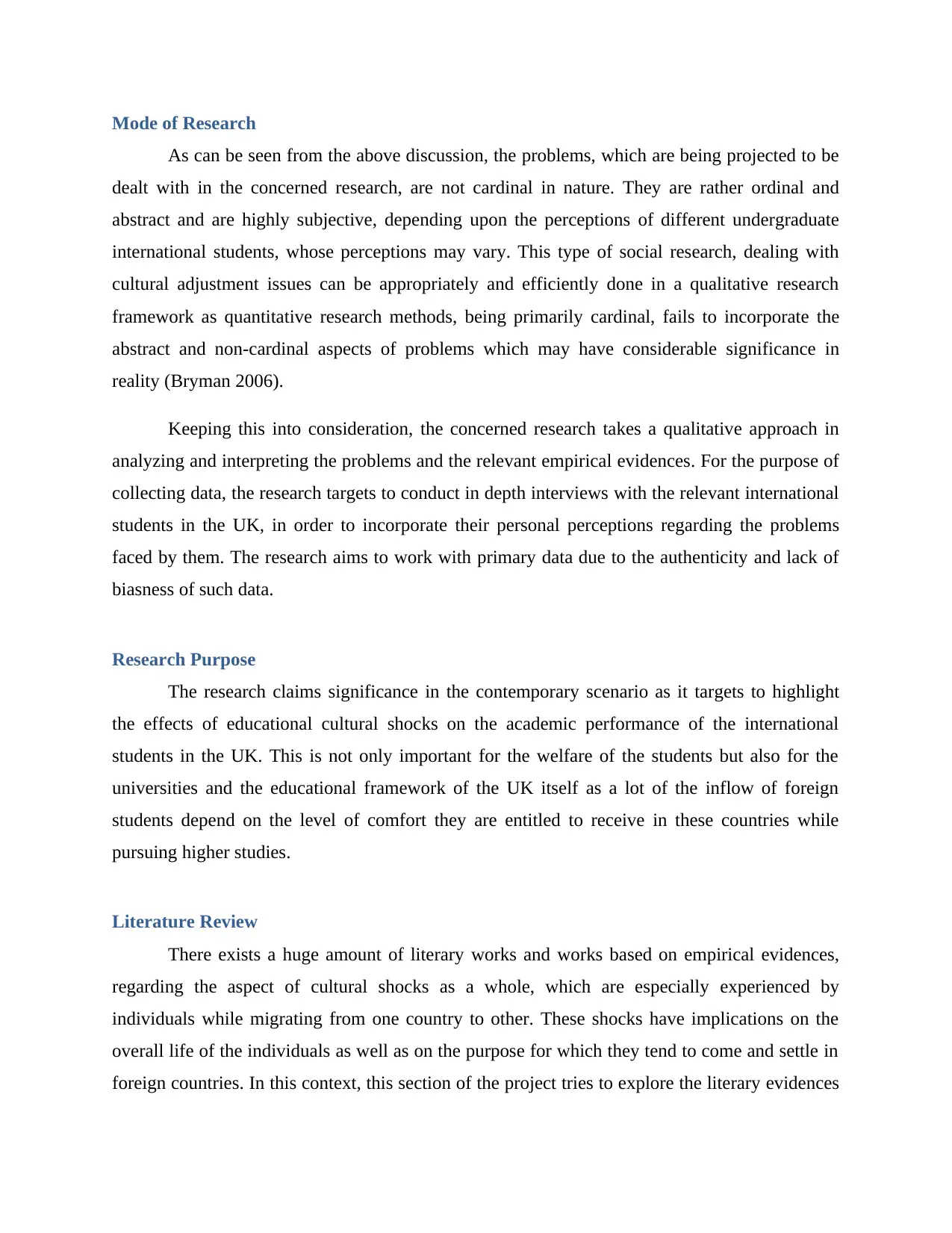
Mode of Research
As can be seen from the above discussion, the problems, which are being projected to be
dealt with in the concerned research, are not cardinal in nature. They are rather ordinal and
abstract and are highly subjective, depending upon the perceptions of different undergraduate
international students, whose perceptions may vary. This type of social research, dealing with
cultural adjustment issues can be appropriately and efficiently done in a qualitative research
framework as quantitative research methods, being primarily cardinal, fails to incorporate the
abstract and non-cardinal aspects of problems which may have considerable significance in
reality (Bryman 2006).
Keeping this into consideration, the concerned research takes a qualitative approach in
analyzing and interpreting the problems and the relevant empirical evidences. For the purpose of
collecting data, the research targets to conduct in depth interviews with the relevant international
students in the UK, in order to incorporate their personal perceptions regarding the problems
faced by them. The research aims to work with primary data due to the authenticity and lack of
biasness of such data.
Research Purpose
The research claims significance in the contemporary scenario as it targets to highlight
the effects of educational cultural shocks on the academic performance of the international
students in the UK. This is not only important for the welfare of the students but also for the
universities and the educational framework of the UK itself as a lot of the inflow of foreign
students depend on the level of comfort they are entitled to receive in these countries while
pursuing higher studies.
Literature Review
There exists a huge amount of literary works and works based on empirical evidences,
regarding the aspect of cultural shocks as a whole, which are especially experienced by
individuals while migrating from one country to other. These shocks have implications on the
overall life of the individuals as well as on the purpose for which they tend to come and settle in
foreign countries. In this context, this section of the project tries to explore the literary evidences
As can be seen from the above discussion, the problems, which are being projected to be
dealt with in the concerned research, are not cardinal in nature. They are rather ordinal and
abstract and are highly subjective, depending upon the perceptions of different undergraduate
international students, whose perceptions may vary. This type of social research, dealing with
cultural adjustment issues can be appropriately and efficiently done in a qualitative research
framework as quantitative research methods, being primarily cardinal, fails to incorporate the
abstract and non-cardinal aspects of problems which may have considerable significance in
reality (Bryman 2006).
Keeping this into consideration, the concerned research takes a qualitative approach in
analyzing and interpreting the problems and the relevant empirical evidences. For the purpose of
collecting data, the research targets to conduct in depth interviews with the relevant international
students in the UK, in order to incorporate their personal perceptions regarding the problems
faced by them. The research aims to work with primary data due to the authenticity and lack of
biasness of such data.
Research Purpose
The research claims significance in the contemporary scenario as it targets to highlight
the effects of educational cultural shocks on the academic performance of the international
students in the UK. This is not only important for the welfare of the students but also for the
universities and the educational framework of the UK itself as a lot of the inflow of foreign
students depend on the level of comfort they are entitled to receive in these countries while
pursuing higher studies.
Literature Review
There exists a huge amount of literary works and works based on empirical evidences,
regarding the aspect of cultural shocks as a whole, which are especially experienced by
individuals while migrating from one country to other. These shocks have implications on the
overall life of the individuals as well as on the purpose for which they tend to come and settle in
foreign countries. In this context, this section of the project tries to explore the literary evidences
Paraphrase This Document
Need a fresh take? Get an instant paraphrase of this document with our AI Paraphraser
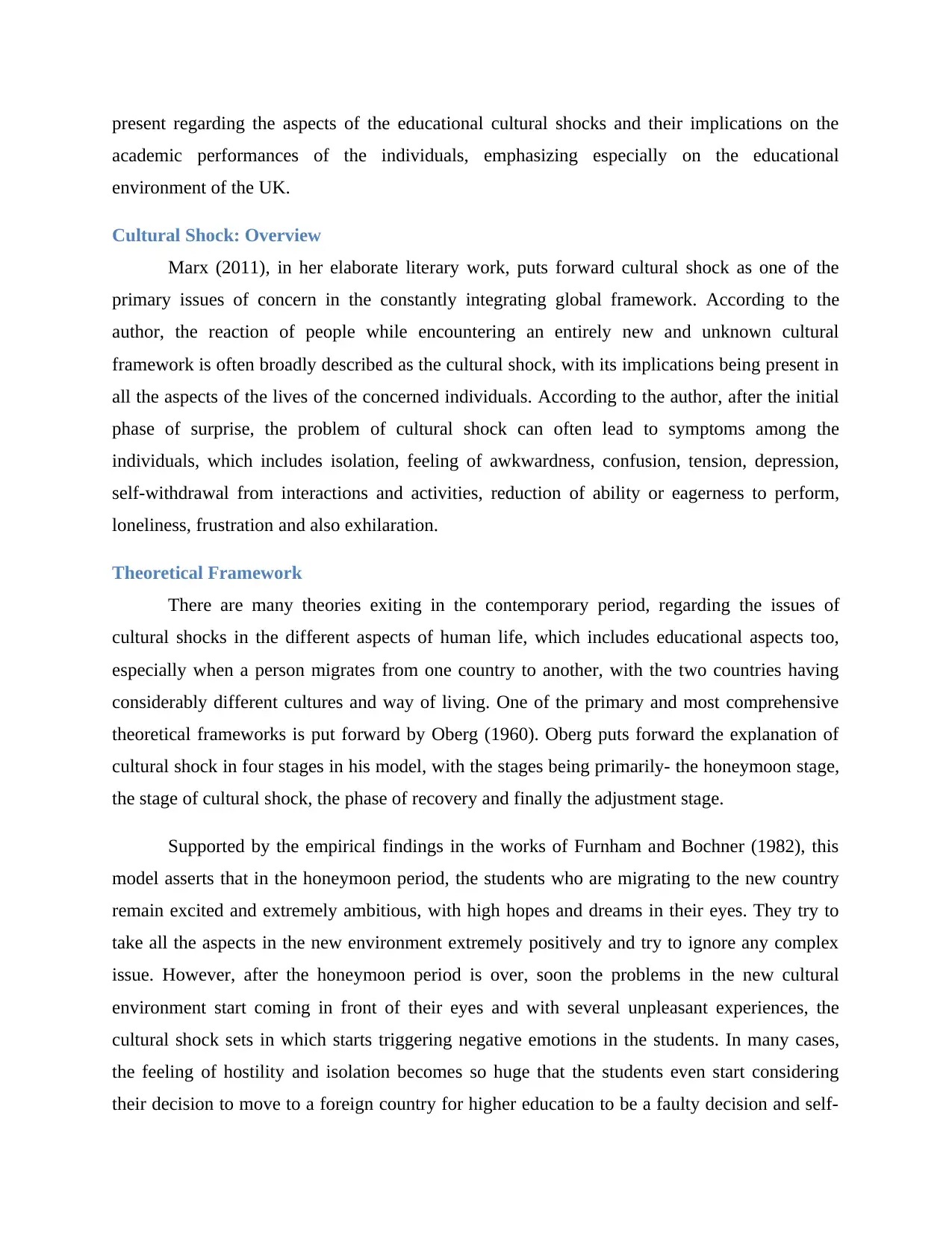
present regarding the aspects of the educational cultural shocks and their implications on the
academic performances of the individuals, emphasizing especially on the educational
environment of the UK.
Cultural Shock: Overview
Marx (2011), in her elaborate literary work, puts forward cultural shock as one of the
primary issues of concern in the constantly integrating global framework. According to the
author, the reaction of people while encountering an entirely new and unknown cultural
framework is often broadly described as the cultural shock, with its implications being present in
all the aspects of the lives of the concerned individuals. According to the author, after the initial
phase of surprise, the problem of cultural shock can often lead to symptoms among the
individuals, which includes isolation, feeling of awkwardness, confusion, tension, depression,
self-withdrawal from interactions and activities, reduction of ability or eagerness to perform,
loneliness, frustration and also exhilaration.
Theoretical Framework
There are many theories exiting in the contemporary period, regarding the issues of
cultural shocks in the different aspects of human life, which includes educational aspects too,
especially when a person migrates from one country to another, with the two countries having
considerably different cultures and way of living. One of the primary and most comprehensive
theoretical frameworks is put forward by Oberg (1960). Oberg puts forward the explanation of
cultural shock in four stages in his model, with the stages being primarily- the honeymoon stage,
the stage of cultural shock, the phase of recovery and finally the adjustment stage.
Supported by the empirical findings in the works of Furnham and Bochner (1982), this
model asserts that in the honeymoon period, the students who are migrating to the new country
remain excited and extremely ambitious, with high hopes and dreams in their eyes. They try to
take all the aspects in the new environment extremely positively and try to ignore any complex
issue. However, after the honeymoon period is over, soon the problems in the new cultural
environment start coming in front of their eyes and with several unpleasant experiences, the
cultural shock sets in which starts triggering negative emotions in the students. In many cases,
the feeling of hostility and isolation becomes so huge that the students even start considering
their decision to move to a foreign country for higher education to be a faulty decision and self-
academic performances of the individuals, emphasizing especially on the educational
environment of the UK.
Cultural Shock: Overview
Marx (2011), in her elaborate literary work, puts forward cultural shock as one of the
primary issues of concern in the constantly integrating global framework. According to the
author, the reaction of people while encountering an entirely new and unknown cultural
framework is often broadly described as the cultural shock, with its implications being present in
all the aspects of the lives of the concerned individuals. According to the author, after the initial
phase of surprise, the problem of cultural shock can often lead to symptoms among the
individuals, which includes isolation, feeling of awkwardness, confusion, tension, depression,
self-withdrawal from interactions and activities, reduction of ability or eagerness to perform,
loneliness, frustration and also exhilaration.
Theoretical Framework
There are many theories exiting in the contemporary period, regarding the issues of
cultural shocks in the different aspects of human life, which includes educational aspects too,
especially when a person migrates from one country to another, with the two countries having
considerably different cultures and way of living. One of the primary and most comprehensive
theoretical frameworks is put forward by Oberg (1960). Oberg puts forward the explanation of
cultural shock in four stages in his model, with the stages being primarily- the honeymoon stage,
the stage of cultural shock, the phase of recovery and finally the adjustment stage.
Supported by the empirical findings in the works of Furnham and Bochner (1982), this
model asserts that in the honeymoon period, the students who are migrating to the new country
remain excited and extremely ambitious, with high hopes and dreams in their eyes. They try to
take all the aspects in the new environment extremely positively and try to ignore any complex
issue. However, after the honeymoon period is over, soon the problems in the new cultural
environment start coming in front of their eyes and with several unpleasant experiences, the
cultural shock sets in which starts triggering negative emotions in the students. In many cases,
the feeling of hostility and isolation becomes so huge that the students even start considering
their decision to move to a foreign country for higher education to be a faulty decision and self-
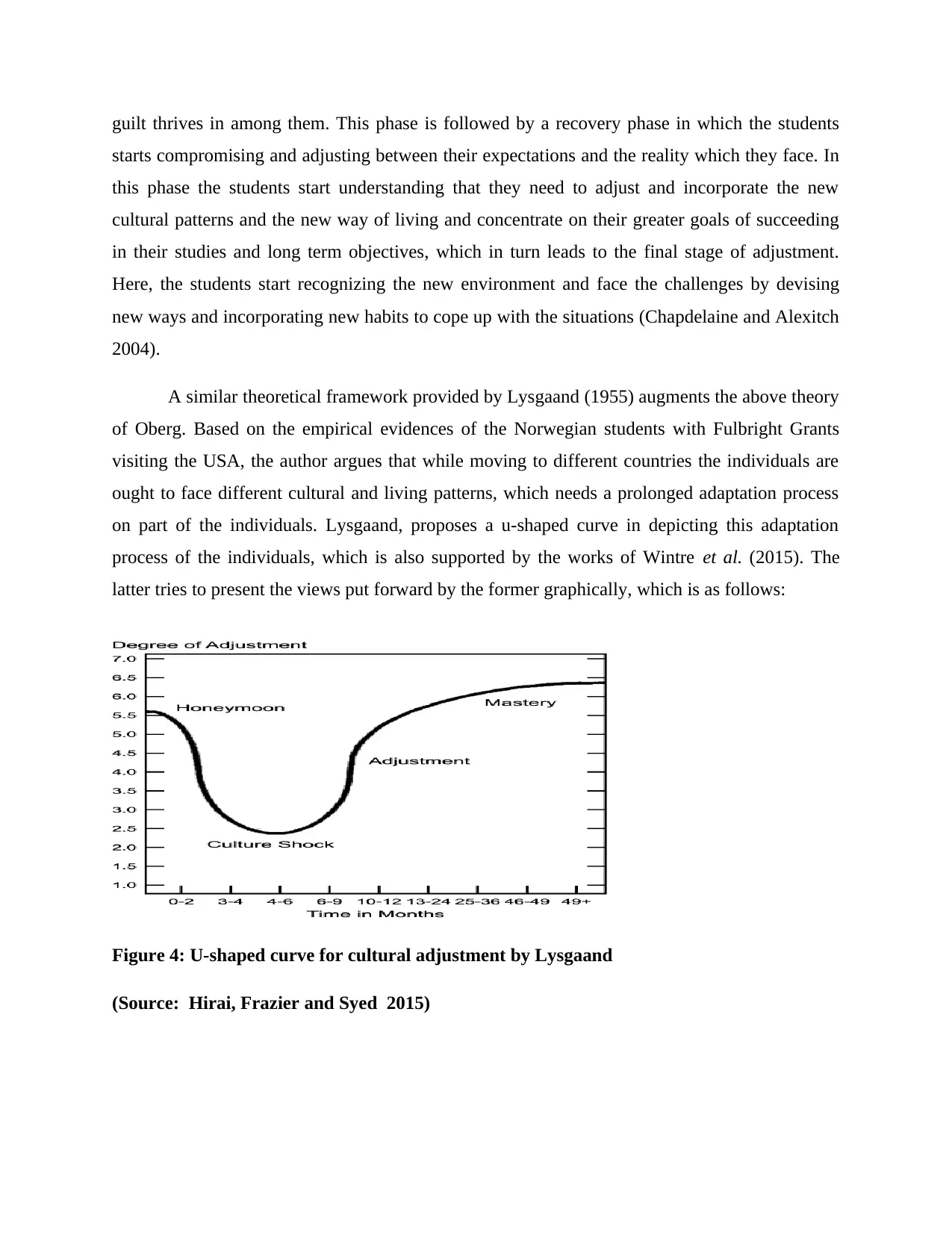
guilt thrives in among them. This phase is followed by a recovery phase in which the students
starts compromising and adjusting between their expectations and the reality which they face. In
this phase the students start understanding that they need to adjust and incorporate the new
cultural patterns and the new way of living and concentrate on their greater goals of succeeding
in their studies and long term objectives, which in turn leads to the final stage of adjustment.
Here, the students start recognizing the new environment and face the challenges by devising
new ways and incorporating new habits to cope up with the situations (Chapdelaine and Alexitch
2004).
A similar theoretical framework provided by Lysgaand (1955) augments the above theory
of Oberg. Based on the empirical evidences of the Norwegian students with Fulbright Grants
visiting the USA, the author argues that while moving to different countries the individuals are
ought to face different cultural and living patterns, which needs a prolonged adaptation process
on part of the individuals. Lysgaand, proposes a u-shaped curve in depicting this adaptation
process of the individuals, which is also supported by the works of Wintre et al. (2015). The
latter tries to present the views put forward by the former graphically, which is as follows:
Figure 4: U-shaped curve for cultural adjustment by Lysgaand
(Source: Hirai, Frazier and Syed 2015)
starts compromising and adjusting between their expectations and the reality which they face. In
this phase the students start understanding that they need to adjust and incorporate the new
cultural patterns and the new way of living and concentrate on their greater goals of succeeding
in their studies and long term objectives, which in turn leads to the final stage of adjustment.
Here, the students start recognizing the new environment and face the challenges by devising
new ways and incorporating new habits to cope up with the situations (Chapdelaine and Alexitch
2004).
A similar theoretical framework provided by Lysgaand (1955) augments the above theory
of Oberg. Based on the empirical evidences of the Norwegian students with Fulbright Grants
visiting the USA, the author argues that while moving to different countries the individuals are
ought to face different cultural and living patterns, which needs a prolonged adaptation process
on part of the individuals. Lysgaand, proposes a u-shaped curve in depicting this adaptation
process of the individuals, which is also supported by the works of Wintre et al. (2015). The
latter tries to present the views put forward by the former graphically, which is as follows:
Figure 4: U-shaped curve for cultural adjustment by Lysgaand
(Source: Hirai, Frazier and Syed 2015)
⊘ This is a preview!⊘
Do you want full access?
Subscribe today to unlock all pages.

Trusted by 1+ million students worldwide
1 out of 53
Related Documents
Your All-in-One AI-Powered Toolkit for Academic Success.
+13062052269
info@desklib.com
Available 24*7 on WhatsApp / Email
![[object Object]](/_next/static/media/star-bottom.7253800d.svg)
Unlock your academic potential
Copyright © 2020–2025 A2Z Services. All Rights Reserved. Developed and managed by ZUCOL.





